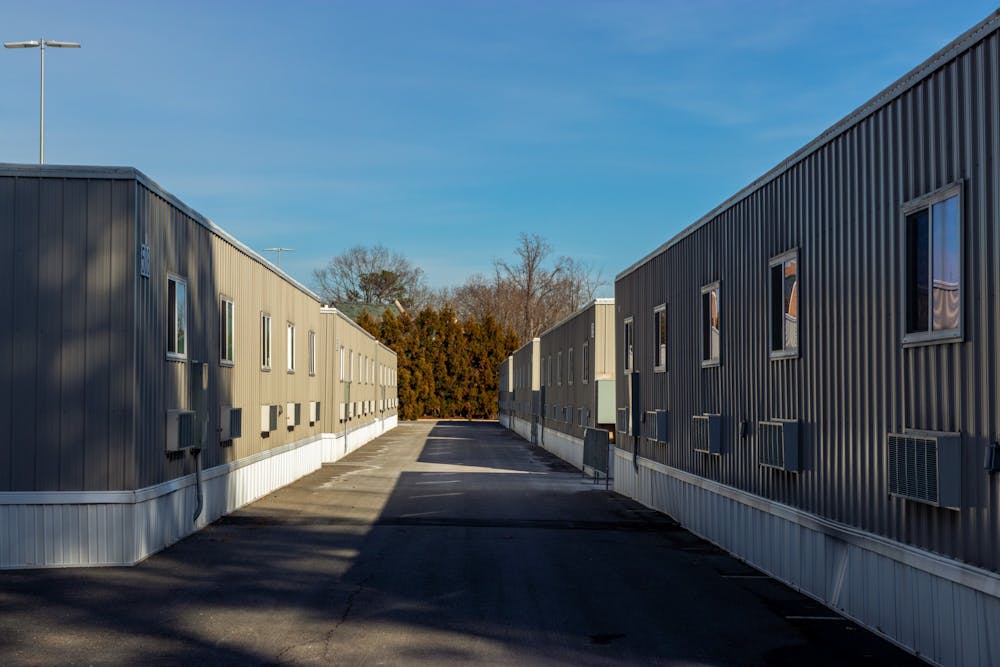After testing positive for COVID-19, Sophomore Ryan Thompson already knew what to expect when he received the phone call from the Office of Residence Life and Housing telling him that it was time to move into an on-campus isolation unit.
Thompson stayed in an isolation unit while he had COVID-19 last year, but the lack of hot water and air conditioning, while he was there in early November, made his experience far worse, he said.
“I was in there when it was about 80 degrees out, so it was very hot,” Thompson said. “The heat gave me headaches on top of the headaches I was already getting from COVID.”
While most of the move-in process was the same as last year, Thompson had to walk with his belongings because Residence Life had stopped offering students rides to the isolation units, which are located in Lot W93 behind Lora Robins Court, he said.
Residence Life stopped offering transportation to isolation units unless a student had an injury or disability over the summer because of a lack of resources, said Patrick Benner, director of Housing and Residence Life.
“We’re in a new phase of living with COVID at this point,” Benner said. “So, as we work back into the regular swing of the academic year, the time and ability we had to do this extra stuff we don’t have anymore now.”
Thompson used up almost the entire two-hour period students are allotted to move into isolation packing and going back and forth from his room in North Court, he said.
“I had to make two trips to grab clothes and blankets and stuff because they don't provide you with that sort of stuff,” Thompson said.
First-year Vikhyat Agarwal, who went into isolation on Oct. 27, tried calling the UR Police Department’s non-emergency line to ask for a ride or even get help with his suitcase, but was denied both requests, he said.
“That was pretty annoying,” Agarwal said. “I had to walk all the way there with the suitcase and it's all the way on the other side of campus because I live in Robins Hall.”
Aside from difficulties getting to the isolation unit, Agarwal said he had trouble having his dietary needs met while in isolation.
“The very first meal they gave me was non-vegetarian, and I called them and after an hour or two they replaced it,” Agarwal said. “They fixed the vegetarian, but kept giving me vegan meat even though I told them I didn’t want that, so at some point I just gave up.”
Enjoy what you're reading?
Signup for our newsletter
Dining Services is scheduled to drop off lunch, dinner and breakfast for the next morning between 11 a.m. and 1 p.m., but the food was usually delivered late, Agarwal said.
Even though meals are counted as a swipe on students’ meal plans, first-year Lydia Slagle asked friends to deliver her food from GrubHub, she said.
“You could tell it just was not the best,” Slagle said. “I had people bring me GrubHub because I could not eat some of the foods they gave us.”
Although Benner said a private vendor comes to retrieve trash and clean 24 hours after a student moves out of an isolation unit, some students said they noticed bugs inside their units. Members of the Residence Life custodial team also replace supplies like bed sheets, soap and paper towels, he said.
Overall, Slagle said the conditions of UR’s on-campus isolation units are manageable for mild to moderate COVID-19 cases, but she expressed concern for students who might have more severe cases of COVID-19 and need extra medical attention.
There are contingency plans in place to help students find isolation and quarantine space off campus, Benner said. Students are encouraged to report positive COVID-19 test results or contact the Student Health Center at 804-289-8064 if they are experiencing COVID-related symptoms.
Benner is confident with UR’s ability to handle COVID-19 cases, but as temperatures drop and flu season picks up biology professor Eugene Wu said students should keep following basic COVID-19 precautions.
“We know what works now … avoiding large crowds, avoiding breathing in somebody else’s face, mask-wearing is still effective, frequent hand washing and good hygiene – those things have carried us through for two years,” Wu said.
Contact news writers Katie Castellani at katie.castellani@richmond.edu and Lucy Jones at lucy.jones1@richmond.edu.
Support independent student media
You can make a tax-deductible donation by clicking the button below, which takes you to our secure PayPal account. The page is set up to receive contributions in whatever amount you designate. We look forward to using the money we raise to further our mission of providing honest and accurate information to students, faculty, staff, alumni and others in the general public.
Donate Now



